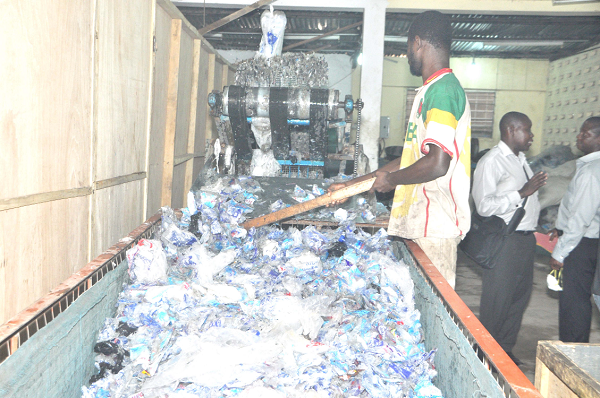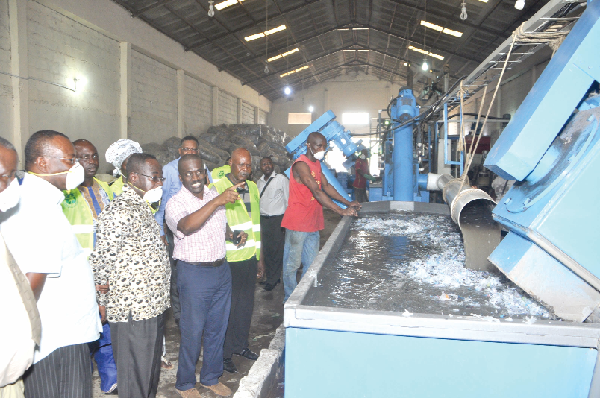Recycling plastics to reduce country’s waste
Making use of emerging recycling technology can turn Ghana’s waste menace into a profitable venture and rid its environment of trash, the Minister of Environment, Science, Technology and Innovation, Dr Joe Oteng-Adjei, has observed.
“There is hope for the future with the right technology,” he said after he had been taken through the operations of some recycling plants in the South Industrial Area in Accra.
Advertisement
Dr Oteng-Adjei first visited Enviroplast Company Limited, a wholly Ghanaian-owned company with 70 employees.
The company, which was established with the view to helping the country manage its plastic waste, recycles between 10 and 15 tonnes of plastic waste daily.
The estimated $2 million Turkish technology recycling plant recycles the plastics into polythene bags, chairs, tables, slippers, and other plastic products.
The Chief Executive Officer of the company, Mr Yiadom B. Kessie, said the country needed to train electrical and electronic engineers who would be able to manufacture such recycling plants to reduce the cost of importing them.
“When we established the company, we were afraid we may not get the materials but they are coming, and we are very happy,” he stated.
Indeed, volumes of packed plastics in transparent polythene sheets had been heaped in various corners, even around the entrance to the company.
According to Mr Kessie, those into buy-back plastic business were in good business as there was a ready market for the plastics that they collected.
Some could be making about GH¢4,000 a month, he stated, adding that environmental issues regarding plastic wastes were no longer relevant as the technology to recycle the waste material was available.

Dr Oteng-Adjei also visited Rafman Enterprise, a small plant at Tesano with a staff of six. The company started its operations only last month and currently recycles a tonne or two daily into pallets, which it sells to producers of polythene bags.
The Chairman of the Plastic Waste Management Programme, Mr Ebow Botwe, said there were 19 recycling plants across the country operating daily.
He indicated that looking at the challenges that the country had faced with the management of plastic waste, a lot of progress had been made in addressing the issue.
Incidentally, the country, according to Dr Oteng-Adjei, was only able to manage 20 per cent of its plastics; the remaining 80 per cent is left to float in the ocean, rivers, drains, and other places.
Unfortunately, the minister added, those plastics did not decompose, and, therefore, posed environmental and health problems to people.
Dr Oteng-Adjei, however, said the country was in the process of banning some types of plastics following a Cabinet decision last year.
An official of Wells Plastics Limited, Mr George Prah, who was part of the minister’s delegation, told the Daily Graphic that the company was promoting the use of biodegradable plastics by using Oxo-Biodegradable Additive Masterbathches, a type of chemical which allows the plastics to decompose after sometime.
Regrettably, he said, Ghana was yet to buy into the idea of making the plastics biodegrable, after more than five years of discussions.




